Act I
The garden and mansion at the Rostov estate. The spring of 1809.
Otradnoye, the estate of Count Rostov, the district Marshal of the Nobility. Prince Andrei Bolkonsky, who has come to Count Rostov in connection with the running of the estate, recalls an old oak tree which he recently saw in the forest. With its dried, broken branches and its scarred bark, the old oak stood out amidst the youthful forest verdure and seemed to be speaking out through its appearance “Spring, love, happiness. Are you not weary of that stupid, meaningless, constantly repeated fraud! There is no spring, no sun, no happiness.” Prince Andrew thinks that the happy days of youth are behind and he has just to “live out his life, content to do no harm, and not disturbing or desiring anything.” Natasha Rostova, thrilled by the beauty of the spring night, is unable to sleep. Prince Andrei recognises the voice of the young girl who attracted his attention in the course of the day. “There is something very, very special in this young girl who wants to fly away,” he says, seized by an “unreasoning springtime feeling of joy and renewal.”
Moscow. The ball at an old grandee of Catherine’s the Great's time
On New Year’s Eve, Count Rostov brings Natasha and his daughter-in-law Sonya to the ball. Guests are arriving. Among them are Count Pierre Bezukhov and his wife, the lovely Countess Hélène and her brother, Anatole Kuragin.
The polonaise is followed by a mazurka, then a waltz. Terribly anxious, Natasha, who has never before been to a grand ball, thinks that nobody notices her and that she will not dance at all. Count Pierre Bezukhov, guessing at the young girl’s feelings, approaches Prince Andrei and suggests that he invite Natasha for a waltz. Andrei admires the shy grace of this “very special” girl; he is increasingly enchanted by Natasha’s youthful enthusiasm. “He asked her to waltz… ‘I have long been waiting for you,’ the frightened but happy girl seems to say by the smile that has conquered the threat of tears, as she raises her hand to Prince Andrei’s shoulder.” After the dance with Natasha, Prince Andrei, quite to his own surprise, tries to guess his fortune “If she goes to her cousin first and then to another lady, she will be my wife.” Natasha goes first to her cousin.
The drawing room in the mansion of old Prince Bolkonsky
Count Rostov and Natasha, now already engaged to Prince Andrei, have come for their first visit to old Prince Bolkonsky. Natasha believes that the prince, on knowing her closer, will no longer disapprove of his son’s intention to marry and will love her. But Prince Bolkonsky refuses to receive the Rostovs. They are received by his daughter Princess Marya. Natasha is indignant to the point of tears by the princess’s coldness and by the insulting behaviour of the old prince who suddenly appears. She does not wish to stay any longer in this inhospitable house. Natasha feels the pangs of love, stronger than ever before, for Prince Andrei who has been obliged by his father to spend a year abroad.
The divan-room of Hélène Bezukhova
A ball in the house of Hélène Bezukhova. Count Rostov, invited to this soirée with Na¬tasha and Sonya, is “displeased to see that the company consists almost entirely of men and women known for their loose conduct.” Hélène knows that Natasha is betrothed to Prince Andrei, ”one of the most energetic, well-educated and clever young men”, yet she readily helps her dissolute brother Anatole Kuragin to make advances on the pretty young girl, whom he noticed before at the New Year ball. The idea to bring together her brother and Natasha amuses the countess. When Anatole and Natasha are left alone, Anatole expresses his love to her and passes her a letter in which he suggests that they elope. Natasha is in disarray. She cannot resist the flood of emotions that is overpowering her. “How dear, how terribly dear this man suddenly became to me.” Sonya tries to bring her back to reason and to warn her.
Dolokhov’s room
Anatole Kuragin has instigated Dolokhov to arrange a secret wedding of him and Natasha Rostova. However, having made all the preparations and having also found money and a coachman, Dolokhov attempts to dissuade Kuragin from his wild plan, but the latter is unbending and readies himself to set out for Natasha.
The mansion of Marya Dmitriyevna Akhrosimova
In the ante-chamber of Marya Akhrosimova’s mansion, where the Rostov family is staying, the distracted Natasha is impatiently waiting for Anatole. She has made up her mind to flee with him, breaking off her engagement with Prince Andrei without informing her par¬ents. But Akhrosimova learns about the intended elopement from Sonya and when Anatole calls for Natasha, he finds his way barred by the butler. Kuragin makes his escape. Marya Dmitriyevna is indignant at Natasha’s conduct and rebukes the girl but, afraid of publicity, she begs Pierre Bezukhov, who has come for a visit, to take measures “as otherwise there will be a scandal and a duel.” Pierre, who has recently begun to think about the girl who is engaged to his friend with an excitement that terrifies him, fails to understand how Natasha could make such a decision. On seeing her suffering, however, at the news that Anatole is married and at her sense of guilt committed in respect of Prince Andrei, Pierre, in a gush of compassion, tenderness and love, suddenly confesses that he loves Natasha himself.
Pierre Bezukhov’s room
Hélène is receiving guests in her husband’s room. Pierre comes in and demands that Anatole Kuragin leave Moscow immediately. The frightened Anatole agrees to this demand. Pierre finds his home despicable, his riches useless and the people around him worthless. Pierre’s friend, Vasily Denisov, brings news that Napoleon has advanced his troops to the Russian frontier.
Act II
On the eve of the Battle of Borodino
Getting ready for the battle of Borodino, militiamen are building a redoubt. The troops are being brought in. Lieutenant-Colonel Denisov, looking for Field-Marshal Kutuzov, meets Prince Andrei and tells him about his plan of a partisan campaign at the enemy’s rear. Prince Andrei, on meeting Denisov, who had once proposed to the fifteen-year-old Natasha Rostova, is carried back by both sweet and sad memories. Pierre Bezukhov arrives on the battlefield to see the battle for himself. He distracts Prince Andrei from his gloomy thoughts about Natasha’s breach of their engagement and the death of his father. “The burning of Smolensk and its abandonment formed an epoch in Prince Andrei’s life. A novel feeling of anger against the enemy have made him forget his own sorrow. He was entirely devoted to the affairs of his regiment and was considerate and kind to his men and officers.” In the regiment they called him “our prince”, they were proud of him and they loved him. Field-Marshal Kutuzov appears, warmly welcomed by all. “A wonderful, a matchless people,” he says. “The beast will be mortally wounded by all of Russia’s might, it will be driven out of our sacred land.”
The Shevardino Redoubt during the Battle of Borodino
Napoleon, encircled by his marshals is watching the course of the battle from the Shevardino Redoubt. In his dreams he already imagines Moscow captured, a deputation with the keys of the great city. But instead of glad tidings about their victory, news about killed and wounded generals arrives from all sides; messengers of the French commanders come to Napoleon one after another to ask for reinforcements. Napoleon has a presentiment of impending catastrophe.
A Council of War in Fili
Field-Marshal Kutuzov is holding a council of war in Fili. Should they risk the loss of the army and the fall of Moscow, fighting from disadvantageous positions, or retreat from the capital and save the army, and with it the hopes for a successful outcome to the war? Having heard the views of Bennigsen, Barclay de Tolly, Yermolov and Rayevsky, Kutuzov issues the order to retreat to protect the army and Russia’s well-being “The enemy will not be in Moscow for long. This will be their last victory.”
A street in Moscow, occupied by the French
Moscow is deserted, abandoned by its residents. The deputation with the keys of the city awaited by Napoleon has not arrived. Pierre has remained in Moscow “to meet Napoleon and kill him, either to perish or put an end to the misery of all Europe.” Pierre learns from the Rostov family’s chatelaine that the Rostovs have left Moscow. At Natasha’s insistence, the wounded soldiers staying in their mansion have been taken with them. It is concealed from her, however, that Prince Andrei is among them. Moscow burns. A group of prisoners accused of starting fires are led in by French soldiers. Among them are Pierre Bezukhov and Platon Karatayev, a wounded soldier taken by the French from a hospital. Fulfilling Marshal Davoût’s order, the French soldiers execute several Russians by firing squad. The fire becomes increasingly intense. The compassionate Muscovites gather around a group of madmen coming out of the hospital. The panic-stricken artistes of the French theatre flee. Napoleon and his suite are making their way through smoke. He marvels at the courage of the Russians.
A gloomy peasant hut in the village of Mytishchi
The heavily wounded Prince Andrei is lying in a peasant hut at Mytishchi. His anxious thoughts about the destiny of his homeland and Moscow, about Natasha are affected by delirium. When Andrei sees Natasha entering the hut, he takes her for one of his visions. But on being convinced that before him is the “real, living and breathing” Natasha, Prince Andrei confesses his love to her. Natasha, both happy and suffering, begs him for forgiveness. But Prince Andrei’s strength leaves him. Again he begins to rave, and Natasha feels with horror the life of her beloved passing away with the end of his delirium.
The Smolensk road during a blizzard.
Groups of exhausted people are staggering along the Smolensk road. These are the remains of Napoleon’s army, shamefully retreating from Moscow. Many of the French soldiers are to find their deaths on the snowbound Russian land. The regular troops of the Russian Army led by Field-Marshal Kutuzov are arriving. He congratulates all on the victory, “The enemy has been beaten... Russia is saved!”
(The theatre has made some cuts for the current production of the opera War and Peace in comparison to the composer’s full version. The numbers of the scenes are therefore omitted.)
Part 1 (Peace)
The Overture or the Epigraph usually precedes the action
Scene 1: After dark, in the garden of Count Rostov's country estate, May, 1806
Andrei, who is a guest there, is depressed by the loss of his wife. Natasha, who also cannot sleep, looks out of her window and tells Sonya how beautiful the garden looks in the moonlight, and Andrei recovers his spirits.
Scene 2: New Year's Eve, 1810
At a ball in St Petersburg attended by the Tsar, Pierre encourages Andrei, who is attracted to Natasha, to ask her to dance. Anatole, also attracted to her, asks Hélène to arrange an introduction.
Scene 3: Town house of Prince Nikolai, February 1812
Count Rostov and Natasha visit Prince Nikolai's home. He is the father of Andrei, to whom she is engaged. Andrei has been abroad for a year. Princess Marya indicates that her father will not see them, and Count Rostov departs. However, the Prince, dressed eccentrically and behaving boorishly, does appear, and Natasha realises that he does not approve of the marriage.
Scene 4: Pierre's Moscow house, May 1812
Hélène tells Natasha that Anatole is attracted to her, and, after some hesitation, Natasha hears his declaration of love and agrees to meet him.
Scene 5: Dolokhov's apartment, 12 June 1812
Dolokhov has made the arrangements for his friend Anatole's elopement with Natasha. The coach-driver Balaga, Dolokhov and Anatole drink to the escapade and to the latter's mistress Matriosha.
Scene 6: Later that night
Natasha discovers that Sonya has given away her secret to Madame Akhrosimova, with whom they are staying. Anatole and Dolokhov are sent away by Gavrila, and Akhrosimova reduces Natasha to tears. Pierre arrives, reveals that Anatole is married, and agrees to ask Andrei to forgive Natasha. He shyly admits that he himself would want to marry her if he were free. Natasha makes her peace with Sonya.
Scene 7: Later still
Hélène is entertaining Anatole, Metivier and an Abbé. Pierre, returning home, upbraids Anatole and demands that he leave Moscow immediately. He agrees, and Pierre is left alone to bemoan his own circumstances. Denisov arrives with the news that Napoleon and his army are crossing into Russia. War is inevitable.
Part 2 (War)
The Epigraph is usually performed here if it was not used at the start of Part 1.
Scene 8: Near Borodino, 25 August 1812
Amid preparations for the defence of Moscow, Andrei and Denisov discuss utilising partisans to make life difficult for Napoleon's army. Pierre, wanting to observe the scene, arrives, and he and Andrei embrace, perhaps for the last time. Field-Marshal Kutuzov offers Andrei a position on his staff, but Andrei prefers to go into battle with his own regiment. The battle starts.
Scene 9: Later that day
Napoleon ponders his position, first refusing to commit more men, then agreeing. An unexploded cannonball lands at his feet and he kicks it away.
Scene 10: Two days later
Kutuzov and his generals are holding a Council of War at Fili, near Smolensk. The army will be at risk if Moscow is to be defended to the last - but if the army retreats, Moscow will be at the mercy of the French. Kutuzov decides that only by retreating, and potentially sacrificing Moscow, will there be any hope of victory.
Scene 11: Moscow is burning
The city is on fire because its citizens try to avoid a surrender. Pierre is caught up among some Muscovites, including the veteran Platon Karataev, who are accused by the French of fire-raising. As the asylum and theatre burn, lunatics and actresses flee - but Napoleon has to admit that the courage of the people has frustrated his plans.
Scene 12: In a peasant's hut at Mitishi
The wounded Prince Andrei, delirious, has been evacuated with the Rostovs from Moscow. Natasha, who had been unaware that he was among her fellow evacuees, visits him. She tries to apologise for her conduct, but he again declares his love for her, and they sing of their happiness as Natasha reassures him that he will live. He falls asleep, and his heartbeat (conveyed by an offstage chorus) stops for ever.
Scene 13: November, 1812
On the road to Smolensk, the retreating French are escorting a group of prisoners through a snow-storm. Karataev cannot keep up and is shot, but Pierre and the others are rescued by the partisans. Denisov tells Pierre that Andrei is dead but that Natasha is alive and well. Kutuzov and his men rejoice in their victory, and celebrate the indomitable will of the Russian people.


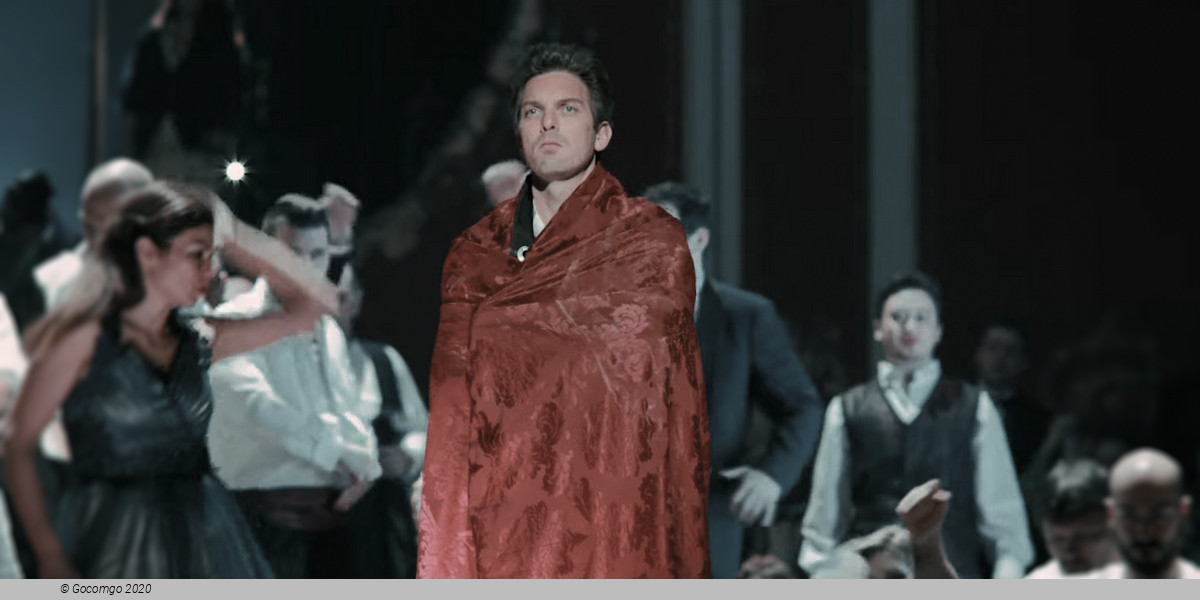
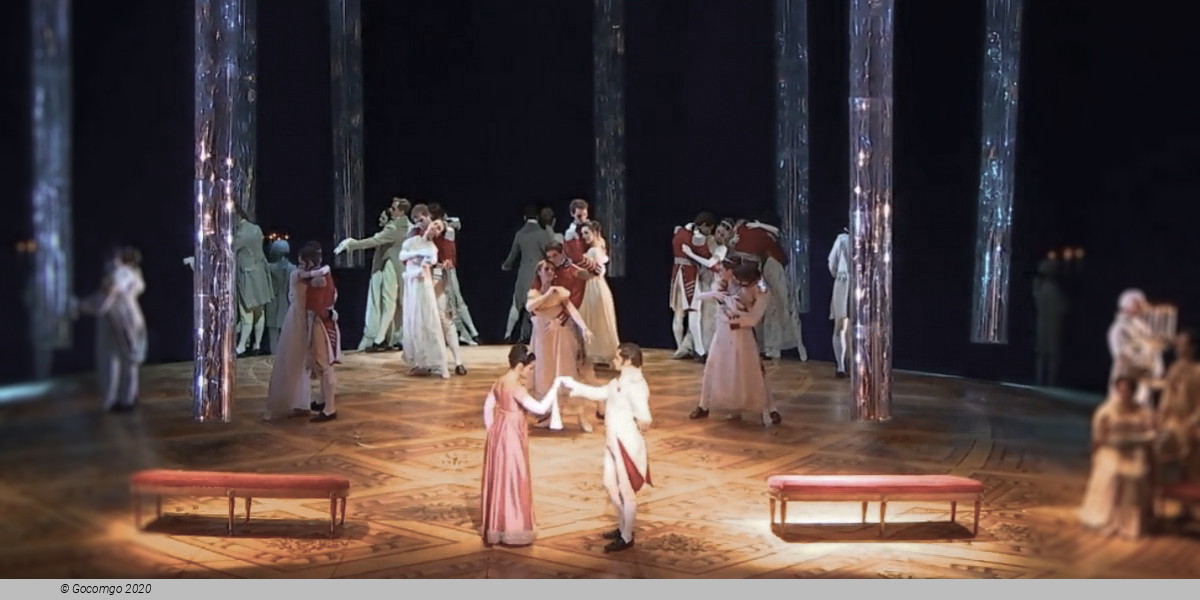
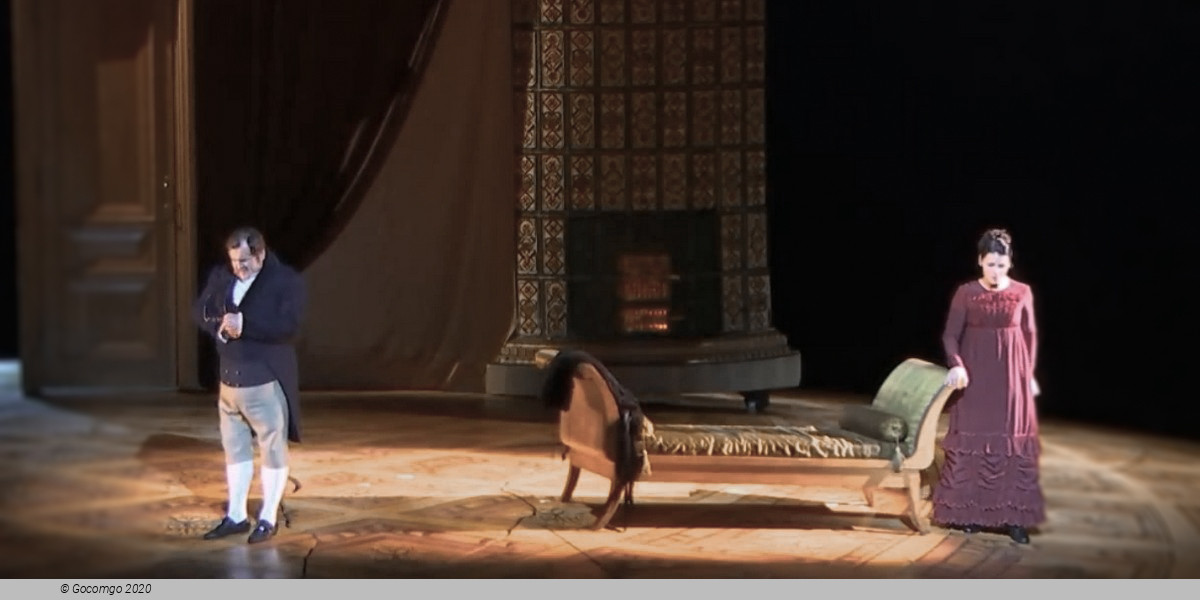
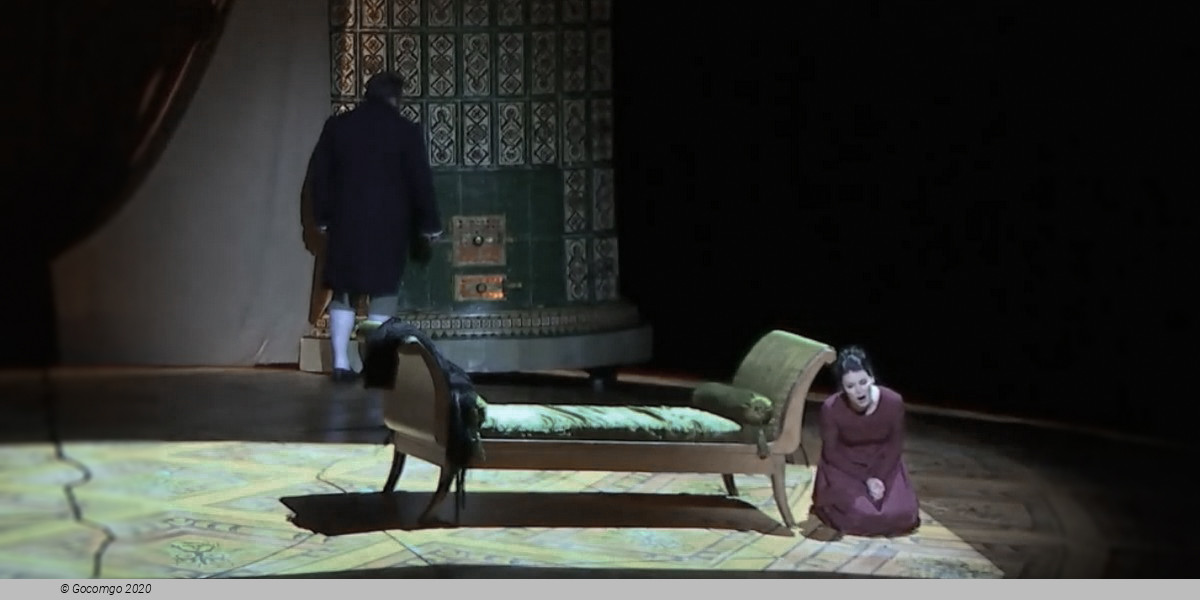
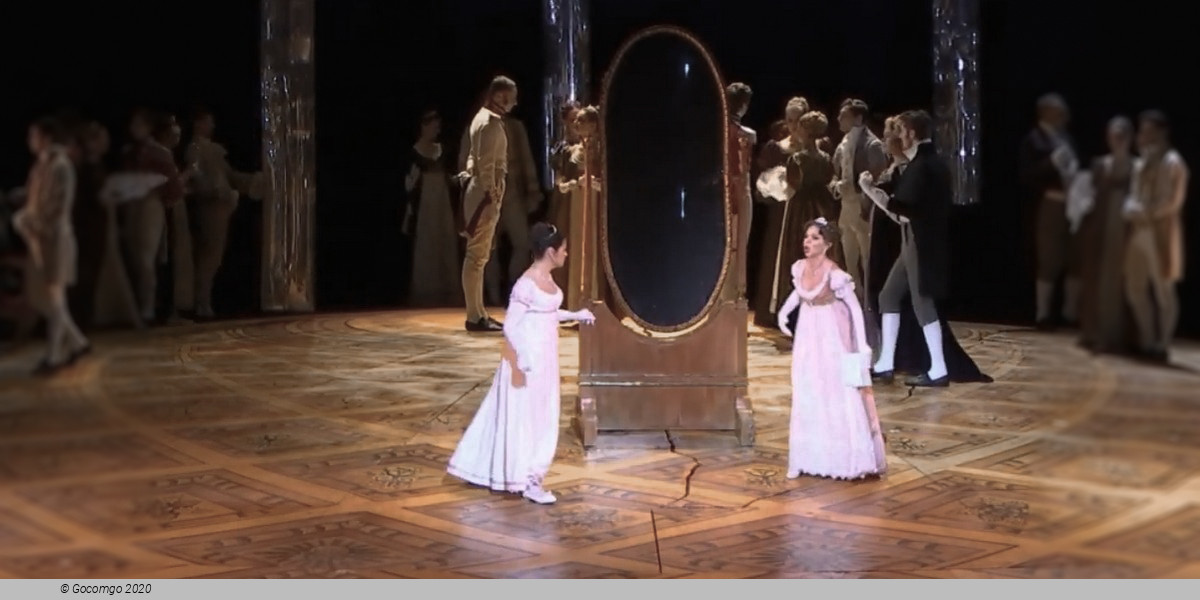
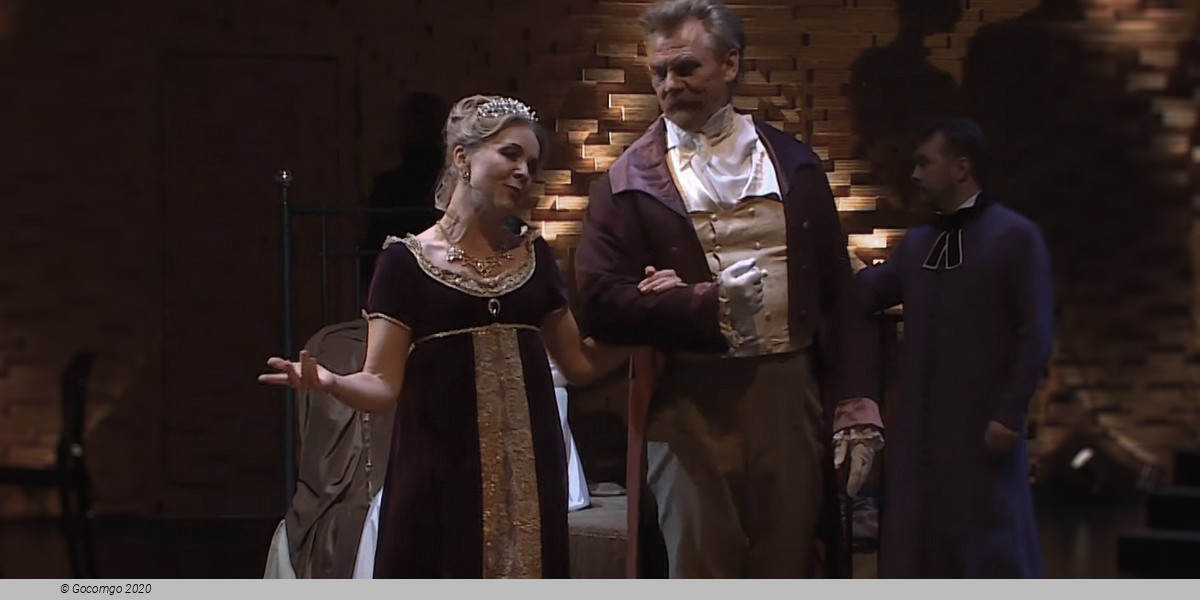
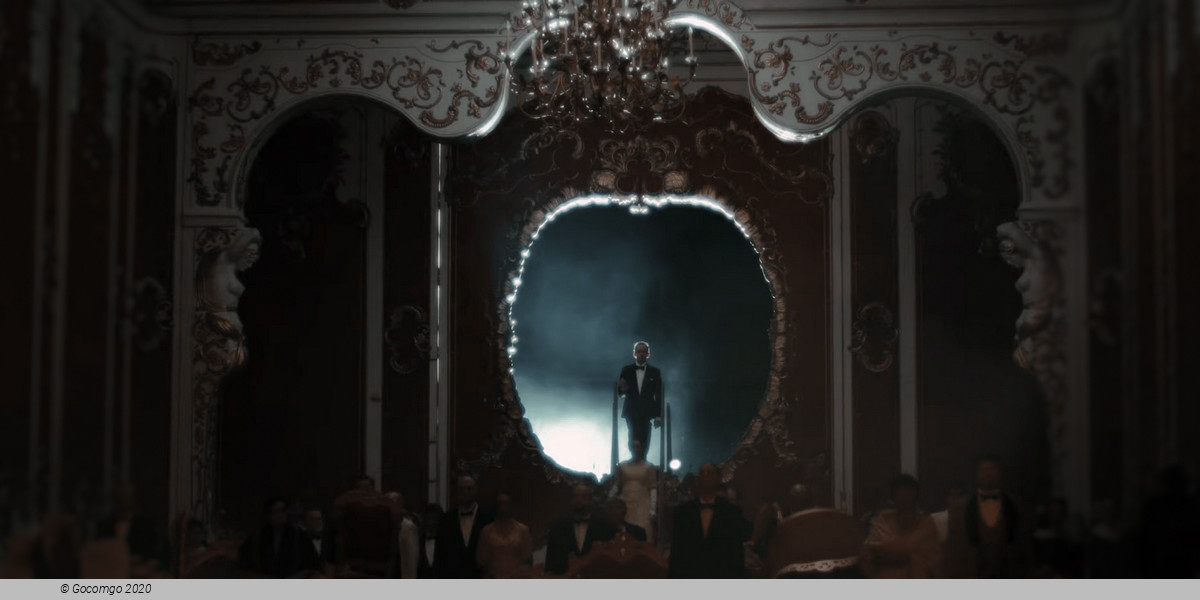
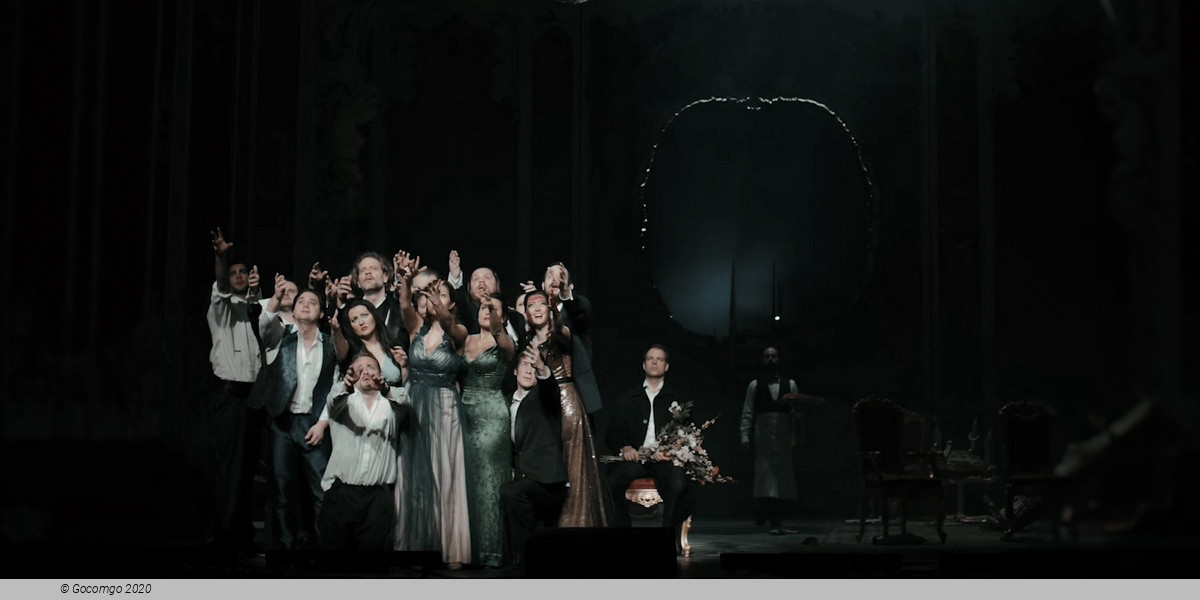
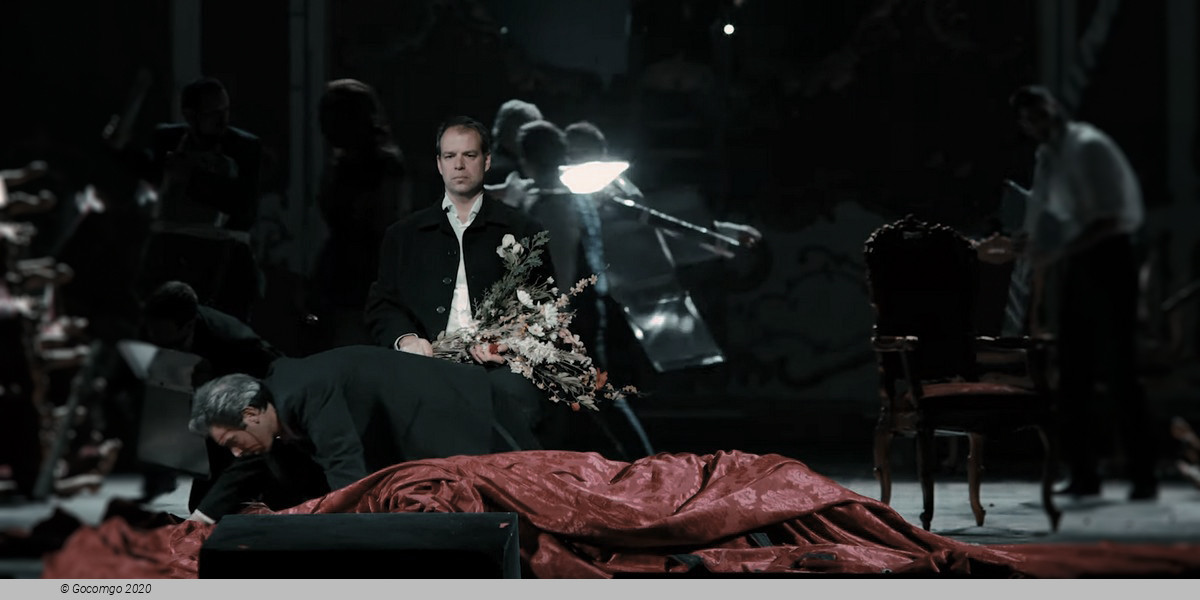
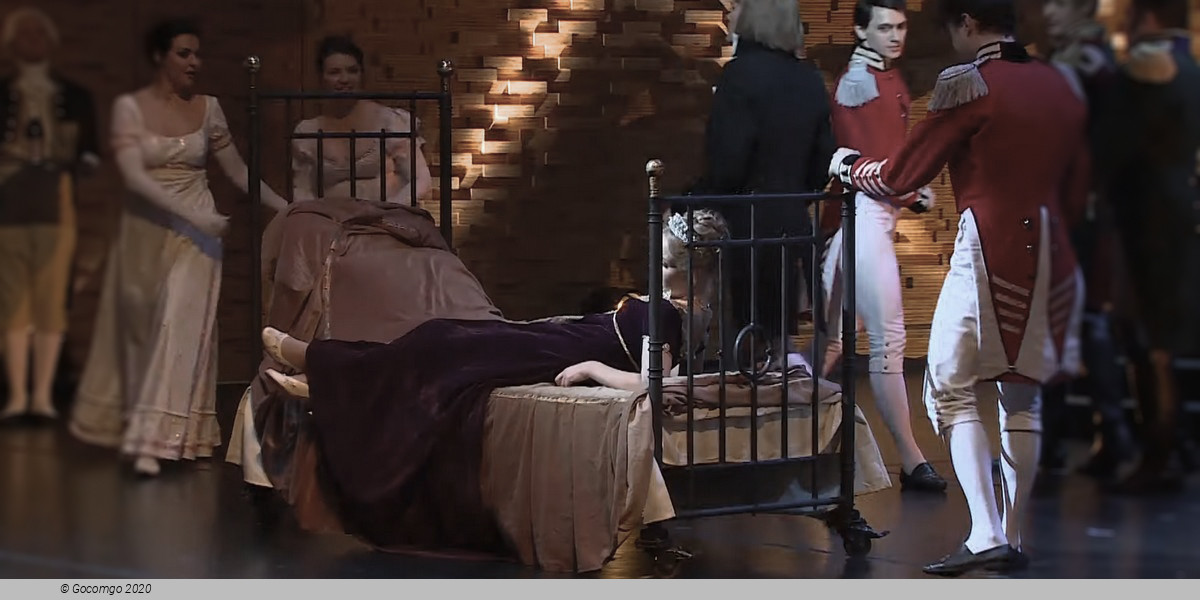
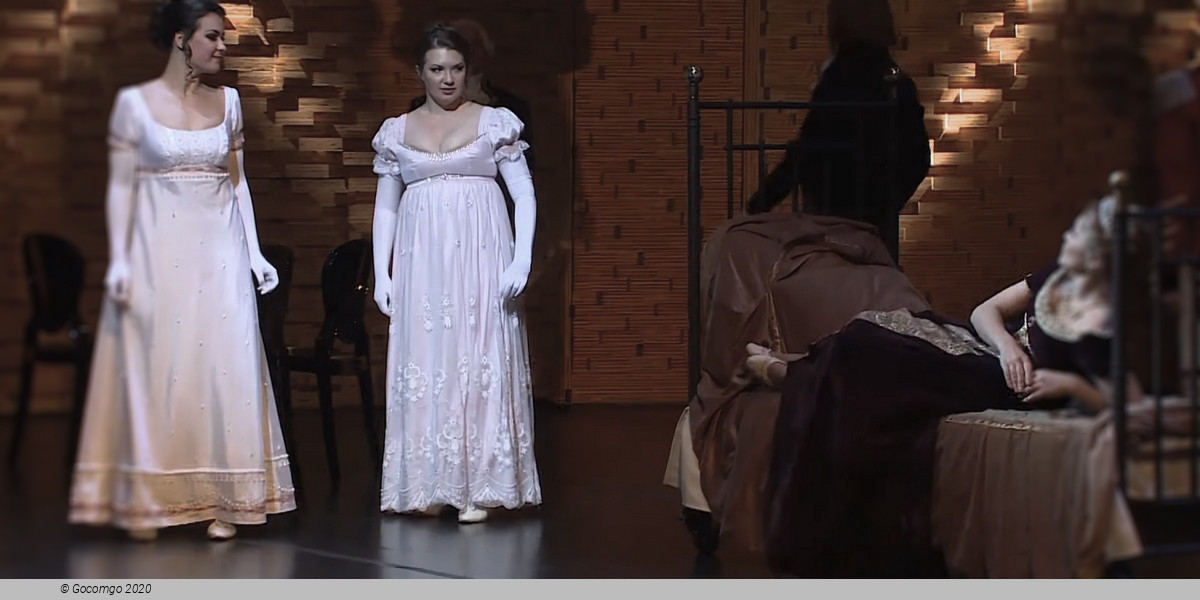
 1 Theatre Square
1 Theatre Square